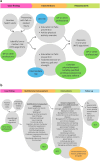Falls prevention in community-dwelling older adults and implementation of world falls guidelines: a call for action across Europe by the European Geriatric Medicine Society Special Interest Group on Falls and Fractures
- PMID: 40506658
- PMCID: PMC12378773
- DOI: 10.1007/s41999-025-01206-y
Falls prevention in community-dwelling older adults and implementation of world falls guidelines: a call for action across Europe by the European Geriatric Medicine Society Special Interest Group on Falls and Fractures
Abstract
Falls among older adults represent a significant public health challenge due to their consequences, including serious injuries, increased morbidity and mortality, decreased quality of life, and heightened healthcare costs. The World Falls Guidelines (WFG), published in 2022, offer a robust framework for evidence-based interventions; however, the uptake of these guidelines into clinical practice across Europe remains inconsistent. Key barriers to implementation include insufficient resources, a lack of trained healthcare professionals, and limited integration into existing healthcare systems. This position paper by the EuGMS Special Interest Group (SIG) on Falls and Fractures addresses the implementation of the WFG among community-dwelling older adults and falls prevention across Europe by providing an overview of the current status of WFG adoption in Europe and discusses the challenges and opportunities for implementation. We provide an overview of the current resources to support the clinical practice of falls prevention, implementation guides, and educational programs. Additionally, we discuss what is necessary for the future development of these resources and for advancing research. The EuGMS SIG on Falls and Fractures advocates for a commitment of healthcare providers as well as insurers, policymakers, and other stakeholders to collaborative European initiatives-such as developing a standardised falls prevention strategy, promoting evidence-based implementation plans, establishing a European-wide research agenda, and creating under- and postgraduate curricula-which are essential for advancing falls prevention efforts across Europe.
Keywords: Accidental falls; Implementation; Older adults; World falls guidelines.
© 2025. The Author(s).
Conflict of interest statement
Declarations. Conflict of interest: On behalf of all authors, the corresponding author states that there is no conflict of interest. DAS is a Director of Later Life Training, a not-for-profit company that delivers training to health and exercise professionals working in falls prevention (Otago Exercise Programme and Falls Management Programme) in the UK and across Europe. Ethical approval: Not applicable. Informed consent: Not applicable.
Figures




References
-
- World Health Organization. (2021) Step safely: strategies for preventing and managing falls across the life-course. World Health Organization. https://apps.who.int/iris/handle/10665/340962. License: CC BY-NC-SA 3.0 IGO
-
- Stel VS, Smit JH, Pluijm SM, Lips P (2004) Consequences of falling in older men and women and risk factors for health service use and functional decline. Age Ageing 33(1):58–65 - PubMed
-
- Hartholt KA, van Beeck EF, Polinder S, van der Velde N, van Lieshout EM, Panneman MJ et al (2011) Societal consequences of falls in the older population: injuries, healthcare costs, and long-term reduced quality of life. J Trauma 71(3):748–753. 10.1097/TA.0b013e3181f6f5e5 - PubMed
-
- EuroSafe. EuroSafe. Injuries in the European Union, Summary on injury statistics 2012–2014 Amsterdam2016 [Available from: http://www.bridge-health.eu/sites/default/files/EuropeSafe_Master_R4_Sin.... Accessed 26 Nov 2024
-
- Blain H, Miot S, Bernard PL (2021) How can we prevent falls? In: Falaschi P, Marsh D (eds) Orthogeriatrics: the management of older patients with fragility fractures. Springer, Cham, pp 273–290 - PubMed
MeSH terms
LinkOut - more resources
Full Text Sources
Medical
Miscellaneous
